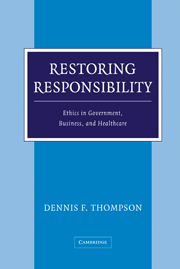Book contents
- Frontmatter
- Contents
- Acknowledgments
- Restoring Responsibility
- Introduction: The Need for Institutional Responsibility
- PART I DEMANDS OF INSTITUTIONAL POLITICS
- PART II VARIETIES OF INSTITUTIONAL FAILURE
- 6 Democratic Secrecy
- 7 Mediated Corruption
- 8 Election Time
- 9 Hypocrisy and Democracy
- 10 Private Life and Public Office
- Part III EXTENSIONS OF INSTITUTIONAL RESPONSIBILITY
- Credits
- Index
10 - Private Life and Public Office
Published online by Cambridge University Press: 29 January 2010
- Frontmatter
- Contents
- Acknowledgments
- Restoring Responsibility
- Introduction: The Need for Institutional Responsibility
- PART I DEMANDS OF INSTITUTIONAL POLITICS
- PART II VARIETIES OF INSTITUTIONAL FAILURE
- 6 Democratic Secrecy
- 7 Mediated Corruption
- 8 Election Time
- 9 Hypocrisy and Democracy
- 10 Private Life and Public Office
- Part III EXTENSIONS OF INSTITUTIONAL RESPONSIBILITY
- Credits
- Index
Summary
The preoccupation with private vice has become a public vice. Debate about the personal lives of public officials is capturing a disproportionate share of public attention and is distorting the character of political discussion. The various social and political causes of this preoccupation have been frequently discussed, but the underlying moral assumptions that support it have been less often analyzed. The increased attention to private lives gains legitimacy from mistaken moral assumptions concerning the nature of political ethics, the basis of privacy of public officials, and the criteria that justify publicizing their personal lives. To begin to restore discursive balance in our politics, we need to understand more clearly how personal and political ethics differ, and why the claims of privacy of public officials and the criteria that justify publicizing their personal lives should rest on the needs of the democratic process.
THE DIFFERENCES BETWEEN PERSONAL AND POLITICAL ETHICS
Political ethics prescribes principles for action in public institutions, and in a democracy its foundation lies in the principles governing the democratic process. It differs from personal ethics in origin, function, and content. Personal ethics originates in face-to-face relations among individuals. It fulfills a social need for principles to guide actions toward other individuals across the familiar range of personal relations. Political ethics originates in institutional circumstances. It arises from the need to set standards for impersonal relations among people who may never meet and must judge one another at a distance.
- Type
- Chapter
- Information
- Restoring ResponsibilityEthics in Government, Business, and Healthcare, pp. 227 - 242Publisher: Cambridge University PressPrint publication year: 2004



